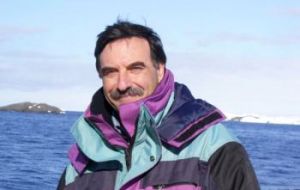MercoPress. South Atlantic News Agency
Russian vessel incident triggers debate on Antarctica growing tourist industry
 French Polar Institute director Yves Frenot was furious with incident that distracted several icebreakers from their normal duties
French Polar Institute director Yves Frenot was furious with incident that distracted several icebreakers from their normal duties The challenging rescue operation launched after a Russian ship became trapped in Antarctic pack ice in December shows the inherent risks facing the frozen continent's burgeoning tourist industry, experts say. Antarctica represents one of the last frontiers for adventurous travelers, an icy wonderland of glaciers, emperor penguins and seemingly endless white expanses.
But, as those aboard the Akademik Shokalskiy found out, blizzards, icebergs and treacherous seas are also a fact of life at one of the most remote locations on Earth, where help is often thousands of kilometers away.
“It does indeed serve as a reminder that it's an extreme environment that we're dealing with, whether it's scientific expeditions going down there or tourism cruises” according to Daniela Liggett, a specialist in Antarctic tourism regulation at New Zealand's Canterbury University.
Tourist numbers in Antarctica have grown from less than 5 000 in 1990 to about 35 000 a year, according to industry figures. Most travel by sea, some paying in excess of 20.000 dollars for a luxury cabin in the peak period from November to March.
There is also a healthy market for sightseeing flights, despite the loss of an Air New Zealand DC-10 in 1979 which crashed into Mount Erebus, killing all 257 on board.
The first recorded tourist ship was an Argentine vessel, Les Eclaireurs, that made the voyage with 100 paying passengers in 1958. Since then, concerns have focused on tourists' potential impact on the untamed wilderness and the difficulty rescuers would face reaching a ship if it hit serious trouble in the freezing waters.
“What's unique to the Antarctic is that it's very remote and if something happens to a bigger ship then it will be almost impossible to rescue all the passengers in a timely fashion,” Liggett said.
With conventional rescue services so far away, the task of helping stricken vessels often falls to the scientific missions, disrupting their carefully planned research programs.
French Polar Institute director Yves Frenot was furious last week that French, Chinese and Australian ships in Antarctica were diverted from scientific work for the Shokalskiy rescue.
“There's no reason to place Antarctica off-limits and to keep it just for scientists, but this tourism has to be monitored and regulated so that operators can be sure of getting help if need be” he said.
The headaches posed by Antarctic rescue were demonstrated when, after the Shokalskiy became mired in the ice on December 24, the Chinese icebreaker Xue Long became trapped itself while trying to help.
The two ships only managed to free themselves on Tuesday, by which time yet another vessel, the US Coast Guard's Polar Star, was steaming to their aid from Sydney.
Half of the 52 people rescued from the Shokalskiy last week were paying passengers and Frenot labeled the voyage a “pseudo-scientific expedition”, a charge denied by its Australian organizers.
They said their mission was to examine environmental changes by replicating measurements taken in the area a century ago by explorer Douglas Mawson.
Ligget said Shokalskiy travelled into an area not normally frequented by tourist or scientific ships, which contributed to it becoming trapped.
She said cruise ships approved by the International Association of Antarctica Tour Operators (IAATO) usually travelled in pairs, so they had a “buddy system” if one experienced difficulties. She added the IAATO, an industry body, has done a good job of minimizing environmental impacts.
“It's essentially the scenery, the wildlife and a relatively unspoiled environment that they're selling to their tourists,” she said. “So it's in their best interests to keep it that way.”




Top Comments
Disclaimer & comment rules-

-

-

Read all commentsA bond of one billion dollars should be mandatory for any commercial organization exploiting the Antarctic for gain.
Jan 11th, 2014 - 09:35 am 0The money could then be used to reimburse the companies / governments getting them out of their difficulties.
What was Tom Selleck doing there?
Jan 11th, 2014 - 10:28 am 0I am not sure there is any real debate going on, more just people talking to reporters when asked a question.
Jan 11th, 2014 - 11:13 am 0Kind of a non story.
Commenting for this story is now closed.
If you have a Facebook account, become a fan and comment on our Facebook Page!